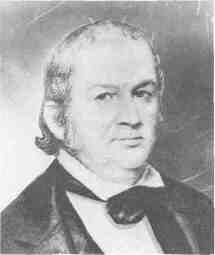Nathaniel Pope
Nathaniel Pope | |
|---|---|
 | |
| Judge of the United States District Court for the District of Illinois | |
| In office March 3, 1819 – January 23, 1850 | |
| Appointed by | James Monroe |
| Preceded by | Seat established by 3 Stat. 502 |
| Succeeded by | Thomas Drummond |
| Member of the U.S. House of Representatives from Illinois Territory's at-large district | |
| In office March 4, 1817 – November 30, 1818 | |
| Preceded by | Benjamin Stephenson |
| Succeeded by | Office abolished |
| Personal details | |
| Born | Nathaniel W. Pope January 5, 1784 Louisville, District of Kentucky, Virginia |
| Died | January 23, 1850 (aged 66) St. Louis, Missouri |
| Resting place | Bellefontaine Cemetery St. Louis, Missouri |
| Political party | Democratic-Republican |
| Education | Transylvania University read law |
Nathaniel W. Pope (January 5, 1784 – January 23, 1850) was an American government leader in the early history of the State of Illinois. He served as the Secretary of the Illinois Territory, then as a Delegate to the United States House of Representatives from the Illinois Territory, and for over thirty years as the United States District Judge for the United States District Court for the District of Illinois.
Education and career[]
Born on January 5, 1784, in Louisville, District of Kentucky, Virginia (now Kentucky),[1] Pope attended Transylvania University and read law in 1804.[1] He was admitted to the bar and entered private practice in Ste. Genevieve, Louisiana Territory (now Missouri) and Kaskaskia, Indiana Territory (Illinois Territory from March 1, 1809) from 1804 to 1809.[1] He was appointed Secretary of the Illinois Territory by President James Madison, serving from 1809 to 1816.[1] He was acting Governor of the Illinois Territory in 1809.[1] He was an Illinois Territorial Militia officer in 1812.[1] Pope was a Democratic-Republican[2]
Congressional service[]
Pope was elected on September 5, 1816, as a Delegate to the United States House of Representatives for a term of two years, serving in the 15th United States Congress from March 4, 1817 to November 30, 1818.[3] He was a register for the United States Land Office in Edwardsville, Illinois Territory (State of Illinois from December 3, 1818) from November 30, 1818 to March 3, 1819.[3][1]
Notable legislation[]
Pope was instrumental both in securing the new territory's admission as the 21st State on December 3, 1818 (the statehood resolution passed regardless of the creative counting to achieve the former minimum of 60,000 persons) as well as in adjusting the new state's northern boundary from the southern extremity of Lake Michigan extending it north to the 42° 30' parallel. Adding the land now included in the thirteen northern counties became very important for Illinois' development, because it included what was to become its largest city (Chicago), although it also slowed Wisconsin's qualification for admission to the Union.[4] Furthermore, Pope drafted the statehood resolution to ensure that 2% of land sales would be used to fund roads and 3% to fund schools, unlike the previous statehood resolutions which required 5% to be used to fund roads.[4]
Federal judicial service[]
Pope was nominated by President James Monroe on March 3, 1819, to the United States District Court for the District of Illinois, to a new seat authorized by 3 Stat. 502.[1] He was confirmed by the United States Senate on March 3, 1819, and received his commission the same day.[1] His service terminated on January 23, 1850, due to his death in St. Louis, Missouri.[1] He was interred in the Colonel O’Fallon Burying Ground and later reinterred at the Bellefontaine Cemetery in St. Louis.[3][5]
Unsuccessful campaign[]
Pope was an unsuccessful candidate for election to the United States Senate in 1824.[3]
Honor[]
Pope County, Illinois, was named for Pope, as was the recently closed Nathaniel Pope Elementary School in North Lawndale, Chicago, Illinois.[citation needed]
References[]
- ^ Jump up to: a b c d e f g h i j Nathaniel Pope at the Biographical Directory of Federal Judges, a public domain publication of the Federal Judicial Center.
- ^ Lusk, David W. (1887). Politics and Politicians of Illinois. Springfield, IL: H. W. Rokker. p. 377.
- ^ Jump up to: a b c d United States Congress. "Nathaniel Pope (id: P000432)". Biographical Directory of the United States Congress.
- ^ Jump up to: a b "Nathaniel Pope — J. Ill. S. H. S. 3:7‑21 (1911)". penelope.uchicago.edu.
- ^ Clark, William; Clark, Jonathan; Society, Filson Historical (19 June 2019). Dear Brother: Letters of William Clark to Jonathan Clark. Yale University Press. ISBN 978-0300090109 – via Google Books.
Sources[]
- "Nathaniel Pope:From Connections and Factional Politics to Champion of Statehood" from Illinois History, December 1993
- United States Congress. "Nathaniel Pope (id: P000432)". Biographical Directory of the United States Congress.
- Nathaniel Pope at the Biographical Directory of Federal Judges, a public domain publication of the Federal Judicial Center.
Further reading[]
- Angle, Paul M. McClelland. Nathaniel Pope from 1784 to 1850, A Memoir. [Springfield, Ill.]: Privately printed, 1937. OCLC 5844104
- Bloom, Jo Tice. "Peaceful Politics: The Delegates from Illinois Territory from 1809 to 1818." The Old Northwest 6 (Fall 1980): 203-15.
- Illinois (Ter.) Laws, Statutes, etc. Laws of the Territory of Illinois, revised and digested, under the authority of the legislature. By Nathaniel Pope. Kaskaskia: Printed by Matthew Duncan Printer to the Territory, 1815.
External links[]
- 1784 births
- 1850 deaths
- People from Edwardsville, Illinois
- Delegates to the United States House of Representatives from Illinois Territory
- Judges of the United States District Court for the District of Illinois
- United States federal judges appointed by James Monroe
- 19th-century American judges
- Transylvania University alumni
- Politicians from Louisville, Kentucky
- 19th-century American politicians
- United States federal judges admitted to the practice of law by reading law
- People from Kaskaskia, Illinois
- Illinois Democratic-Republicans